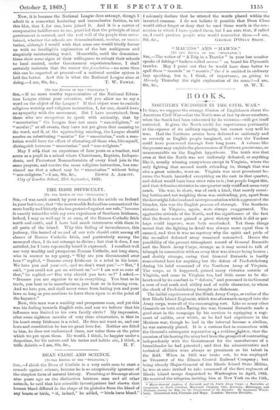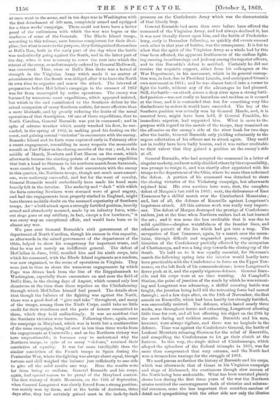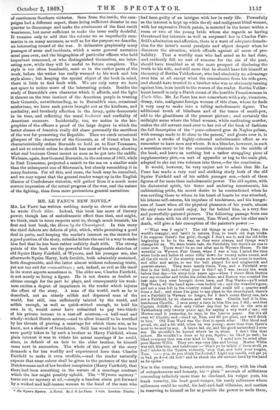BOOKS.
NORTHERN VICTORIES IN THE CIVIL WAR.*
IN time, we suppose the strange illusion of Englishmen about the American Civil ‘Var—that the North won at last by sheer numbers, when the South hail been exhausted by its victories—will get itself corrected. It gives the North credit for superhuman pertinacity at the expense of its military capacity, but cannot very well be true. Had the Northern armies been defeated so uniformly and so severely as English people imagined, not even the Yankees could have persevered through four long years. A volume like the present may explain the phenomenon of Northern persistence, so unaccountable on the English hypothesis. The truth was that even at first the North was not uniformly defeated, or anything like it, usually winning everywhere except in Virginia, where the only fighting that seemed worth attending to, though that was also a great mistake, went on. Virginia was most prominent be- cause the South hazarded everything on the cast in that quarter, and defeat would have been utter ruin to it ; but people forgot this, dud that defensive victories in one quarter only could not mean very much. The war, in short, was of such a kind, that merely count- ing battles and not weighing them was misleading, yet, apart from the downright falsehood and misrepresentation which aggravated the blunder, this was the English process all through. The Southern victories in Virginia, again, were always exaggerated. The aggressive attitude of the North, and the significance of the fact that the South never gained a great victory which it did or per- haps could improve, were both overlooked. Yet these things meant that the fighting in detail was always more equal than it seemed, awl that it was no mystery why the spirit and pride of the so-called defeated army remained untouched. Hence the possibility of the present triumphant record of General Burnside and the Ninth Army Corps, strange as it may sound to talk of triumph in connection with an army that was always being beaten ; and doubly strange, seeing that General Burnside is hardly remembered here for anything but the defeat of Fredericksburg during his brief command of the Northern Army of Virginia. The corps, as it happened, gained many victories outside of Virginia, and some in Virginia too, had little cause to be dis- heartened by its conduct in "defeats," and possessed in its General a man of real mark and ability and of noble character, to whom the check of Fredericksburg brought no dishonour.
The initial experiences of the Ninth Army Corps, or rather of the first Rhode Island Regiment, which was afterwards merged into the Army corps, were all of the encouraging sort. Like so many other Generals on both sides haring the war, General Burnside made a good start in the campaign by his services in equipping a regi- ment of militia, over which, as he had had experience in the Mexican war, though Ile had in the interval become a civilian, he was naturally placed. It is a curious fact in connection with the General's subsequent reputation ay recklessofighter, that the occasion of his leaving the army had been the prospect of contracting independently with the Government for the manufacture of a breechloader he had patented ; and that his administrative and technical abilities were always as prominent as his talent in the field. When in 1861 war broke out, he was employed as Treasurer of the Illinois Central Railroad Company ; but being already Major-General of the Rhode Island State Militia, he was at once invited to take command of the first regiment of Rhode Island troops despatched to Washington in April, 1861. He received the telegram inviting him at New York on the 15th, * Major-General Ambrose 1;'. Burnside and the Ninth Army Corps: a Narrative of Campaigns in North Carolina, Maryland, Virginia, Ohio, Kentucky, Miuissippi, and Tennessee, during the War for the Preservation of the Republic. By Augustus Wood- bury. Illustrated with Portraits and Maps. Loudon: Stevens Brother,
at once went to the scene, and in ten days was in Washington with pressure on the Confederate Army which was the characteristic the first detachment of 500 men, completely armed and equipped for a three weeks' campaign. There could not have been a better proof of the enthusiasm with which the war was begun or the readiness of some of the Generals. The Rhode Island troops, according to this volume, soon became conspicuous' for their disci- pline; but what is more to the purpose, they distinguished themselves at Bull's Run, both in the early part of the day when the battle was undoubtedly going against the South, and in the latter part of the day, when it was necessary to cover the rout into which the retreat of the army, so unfortunately ordered by General McDowell, was converted. Thus, even at Bull's Run there was a kernel of strength in the Virginian Army which made it no matter of astonishment that the South was obliged after it to leave the North its own time to organize and renew the attack. The interval of preparation before McClellan's campaign in the summer of 1862 was far from unoccupied by active operations. The enemy was harassed by numerous coast expeditions, which appeared isolated, but which in the end contributed to the Southern defeat by the actual occupation of many Southern outlets, far more effective than a mere blockade, and by greatly reducing the limits of the naval operations of that description. Of one of these expeditions, that to North Carolina, General Burnside was put in command ; and in spite of adverse weather which nearly wrecked his fleet, he suc- ceeded, in the spring of 1862, in making good his footing on the coast, and gaining several " victories" in encounters with the enemy. Roanoke Island and its forts were captured early in February after a smart engagement, resembling in many respects the memorable assault on Fort Fisher in the closing months of the war ; and, in the middle of March, Newbern and Fort Macon on the coast, which afterwards became the starting-points of an important expedition that lent a hand to Sherman in his northern march from Savannah, were carried by assault. In all their encounters with the enemy in this quarter, the Northern troops, though not much more numer- ous, were uniformly successful, and but for the want of cavalry, General Burnside would undoubtedly have made his hand more heavily felt in the interior. The audacity and " dash " with which the forts covering Newbern were stormed were of good augury, and had the engagements been properly studied in England, might have thrown no little doubt on the assumed superiority of Southern troops. As "a bold attack upon a strongly fortified position, heavily armed and abundantly manned, made by an infantry force, with- out siege guns or any artillery, in fact, except a few howitzers," it was every way an exceptional affair, and would have been so in almost any war.
We pass over General Burnside's civil government of the department of North Carolina, though his success in this capacity, as afterwards in the mixed government of the department of the Ohio, helped to show his competency for important trusts, and that he was not merely an indifferent general. The defeat of McClellan in June, 1862, recalled him and his ninth corps, into which his command, with the Rhode Island regiments as a nucleus, was now organized, to the scene of operations in Virginia. They were just in time to share the numerous engagements by which Pope was driven back from the line of the Rappahannock to Washington, especially those encounters on and near the field of Bull's Run, in the closing days of August, which seemed only less disastrous at the time than those repulses on the Chickahominy through which McClellan himself had passed. The details show that though the balance of the fighting was against the North, there was a good deal of "give and take" throughout, and many of the troops, among them the Ninth Corps, could take no little credit for their steadiness and the posts of honour committed to them, which they held unflinchingly. It was no accident that the Southern victories were barren. Following these, again, came the campaign in Maryland, which was in truth but a continuation of the same campaign, being all over in less than three weeks from the engagements at Centreville ; and as the Northern victory was here unquestionable, it becomes easy to understand why the Northern troops, in spite of so many "defeats," retained their conviction of equality. It was far more intelligible than the similar conviction of the French troops in Spain during the Peninsular War, where the fighting was always about equal, though fortune and skill weighed the balance just sufficiently to one side
to give all the solid results one way. Here the results were far from being so uniform. General Burnside and his corps, again, had special reason to be prousl of the Maryland contest. The first victory of South Mountain, on the 14th of September, when General Longstreet was slowly forced from a strong position, was mainly won by them, and at the battle of Antietam, three days after, they had certainly gained most in the inch-by-inch at once went to the scene, and in ten days was in Washington with pressure on the Confederate Army which was the characteristic of that bloody fray.
General Burnside had more than once before been offered the command of the Virginian Army, and had always declined it, but it was now literally thrust upon him, and the battle of Fredericks- burg, early in December following, so quickly did events succeed each other in that year of battles, was the consequence. It is fair to allow that the spirit of the Virginian Army as a whole had by this time been affected, the apparent fruitlessness of the endless fight- ing causing heartburnings and jealousy among the superior officers, and to this Burnside's defeat is ascribed. Certainly he did not receive the requisite support, either from his colleagues or the War Department, in his movement, which in its general concep- tion was, in fact, due to President Lincoln, and anticipated Grant's own movement in 1864; and he was almost forced into a corner to fight the battle, without any of the advantages he had planned. Still, the battle —an attack across a deep river upon a strong forti- fied position—was not really so hazardous and reckless as it seemed at the time, and it is contended that but for something very like disobedience to orders it would have succeeded. The key of the Southern position was actually won by General Meade, and, it is asserted here, might have been held, if General Franklin, his immediate superior, had supported him. What is more to the purpose with regard to the morale of the troops, they remained on the offensive on the enemy's side of the river bank for two days after the battle, General Burnside only yielding reluctantly to the urgent solicitation of his officers not to attack again. They could not in reality have been badly beaten, and it was rather creditable to their valour that they gained a position on the enemy's side at all.
General Burnside, who had accepted the command in a letter of singular modesty, and now nobly shielded others by his responsibility, was prompt to resign it, and was shortly after appointed with his troops to the department of the Ohio, where lie more than redeemed the defeat. A portion of his command was detached to share the closing victories of the Vicksburg campaign, but afterwards rejoined him: His own services here were, first, the complete defeat of Morgan's last raid in 1863; next, the deliverance of East Tennessee by a skilful march over the Cumberland Mountains ; and, last of all, the defence of Knoxville against Longstreet's impetuous attack. All this autumn work was really very import- ant. The defeat of Morgan destroyed the prestige of Confederate raiders, just at the time when Northern raiders had at Last learned the art ; and it was none the less creditable that it was due to solid qualities—sleepless watchfulness of the frontier lines, and relentless pursuit of the foe which had got into a trap. The occupation of East Tennessee, again, by a march over the moun- tains, through difficult and unguarded passes, completed the bisection of the Confederacy partially effected by the occupation of Chattanooga, and was a long step towards the closing-up of the South. To hold on to it was equally essential, for Sherman's march the following spring into the interior would hardly have been practicable with the Confederates in force on the Upper Ten- nessee, on the left flank of his communications ; hence Long,street's fierce push at it, and the equally- vigorous defence. General Burn- side and his corps were at no time wanting. At Campbell's Station, the point of junction of the roads by which he was retreat- ing and Longstreet was advancing, a skilful covering battle was fought, the junction being held till the retreating force had moved through ; and a few days after, on the 18th of November, the first assault on Knoxville, which had been hastily but strongly fortified, was successfully resisted. The defence, which lasted nearly three weeks, was throughout heroic and exhausting, Longstreet allowing little time for rest, and all but effecting his object on the 29th by the most daring and reckless assaults. Burnside and his men, however, were always vigilant, and there was no loophole in the defence. Time was against the Confederate General, the battle of Lookout Mountain releasing Sherman for the relief of Knoxville, and compelling the Confederates to let go their clutch at the fortress. In this way, the single defeat of Chickainauga, which alloyed the splendour of the Federal triumphs in 1863, was far more than compensated that very autumn, and the North had won a tremendous vantage for the struggle of 1864.
We need pursue no farther the history of Burnside and his corps, which was afterwards that of Grant in his Virginian campaign and siege of Richmond, the continuous though slow success of the North being here undeniable. What has been narrated plainly shows how during the first three years of the war the Northern armies received the encouragement both of victories and substan- tial successes, none the less important that outsiders careless of detail and sympathizing with the other side saw only the illusion
of continuous Southern victories. Seen from the inside, the cam- paigns had a different aspect, there.being sufficient disaster in one quarter to discourage and make the attainment of the final result wearisome, but never sufficient to make the issue really doubtful. It remains only to add that the volume we so imperfectly sum- marize is on many accounts, as well as for the purpose we describe, an interesting record of the war. It delineates graphically many passages of arms and incidents, which a more general narrative must pass over, and the biographies of particular officers who held important command, or who distinguished themselves, are inter- esting now, while they will be useful to future compilers. The style is too often bombastic, most so in the earlier parts of the work, before the writer has really warmed to his work and lets style alone ; but keeping the special object of the book in mind, there is little to find fault with. We are only sorry we have not space to notice more of the interesting points. Besides the study of Burnside's own character which it affords, and the light it throws on the true instinct of the American people in trusting their Generals, notwithstanding, as in Burnside's case, occasional misfortune, we have such points brought out as the kindness, and cordiality, and brotherly affection in the Army, quite democratic in its tone, and reflecting the usual bonhomie and cordiality of American manners. Incidentally, too, we notice in the bio- graphies of the officers a proof of the large degree in which the better classes of America really did share personally the sacrifices of the war for preserving the Republic. Then we catch occasional glimpses of the character of the Generals, as of Grant when he characteristically orders Burnside to hold on to East Tennessee, and not to retreat unless he should loge most of his army, showing what real business Grant meant as soon as he got into the saddle. We learn, again, how General Burnside, in the autumn of 1863, while in East Tennessee, projected a march to the sea on a smaller scale than the subsequent one of Sherman's, but closely resembling it in many features. For all this, and more, the book may be consulted, and we may repeat that the general reader wrapt up in the English illusion of Confederate victories, will gather from it a much more correct impression of the actual progress of the war, and the nature of the fighting, than from more pretentious general narratives.
































 Previous page
Previous page